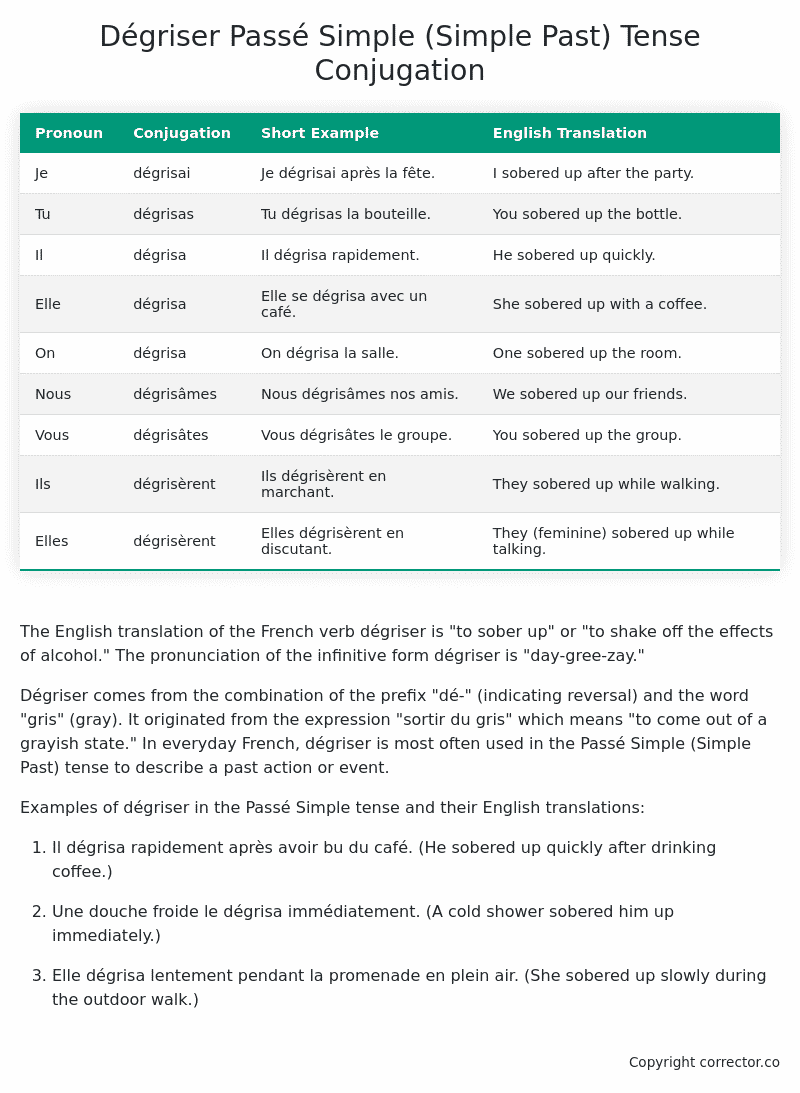Passé Simple (Simple Past) Tense Conjugation of the French Verb dégriser
Introduction to the verb dégriser
The English translation of the French verb dégriser is “to sober up” or “to shake off the effects of alcohol.” The pronunciation of the infinitive form dégriser is “day-gree-zay.”
Dégriser comes from the combination of the prefix “dé-” (indicating reversal) and the word “gris” (gray). It originated from the expression “sortir du gris” which means “to come out of a grayish state.” In everyday French, dégriser is most often used in the Passé Simple (Simple Past) tense to describe a past action or event.
Examples of dégriser in the Passé Simple tense and their English translations:
-
Il dégrisa rapidement après avoir bu du café.
(He sobered up quickly after drinking coffee.) -
Une douche froide le dégrisa immédiatement.
(A cold shower sobered him up immediately.) -
Elle dégrisa lentement pendant la promenade en plein air.
(She sobered up slowly during the outdoor walk.)
Table of the Passé Simple (Simple Past) Tense Conjugation of dégriser
| Pronoun | Conjugation | Short Example | English Translation |
|---|---|---|---|
| Je | dégrisai | Je dégrisai après la fête. | I sobered up after the party. |
| Tu | dégrisas | Tu dégrisas la bouteille. | You sobered up the bottle. |
| Il | dégrisa | Il dégrisa rapidement. | He sobered up quickly. |
| Elle | dégrisa | Elle se dégrisa avec un café. | She sobered up with a coffee. |
| On | dégrisa | On dégrisa la salle. | One sobered up the room. |
| Nous | dégrisâmes | Nous dégrisâmes nos amis. | We sobered up our friends. |
| Vous | dégrisâtes | Vous dégrisâtes le groupe. | You sobered up the group. |
| Ils | dégrisèrent | Ils dégrisèrent en marchant. | They sobered up while walking. |
| Elles | dégrisèrent | Elles dégrisèrent en discutant. | They (feminine) sobered up while talking. |
Other Conjugations for Dégriser.
Le Present (Present Tense) Conjugation of the French Verb dégriser
Imparfait (Imperfect) Tense Conjugation of the French Verb dégriser
Passé Simple (Simple Past) Tense Conjugation of the French Verb dégriser (You’re reading it right now!)
Passé Composé (Present Perfect) Tense Conjugation of the French Verb dégriser
Futur Simple (Simple Future) Tense Conjugation of the French Verb dégriser
Futur Proche (Near Future) Tense Conjugation of the French Verb dégriser
Plus-que-parfait (Pluperfect) Tense Conjugation of the French Verb dégriser
Passé Antérieur (Past Anterior) Tense Conjugation of the French Verb dégriser
Futur Antérieur (Future Anterior) Tense Conjugation of the French Verb dégriser
Subjonctif Présent (Subjunctive Present) Tense Conjugation of the French Verb dégriser
Subjonctif Passé (Subjunctive Past) Tense Conjugation of the French Verb dégriser
Subjonctif Imparfait (Subjunctive Imperfect) Tense Conjugation of the French Verb dégriser
Subjonctif Plus-que-parfait (Subjunctive Pluperfect) Tense Conjugation of the French Verb dégriser
Conditionnel Présent (Conditional Present) Tense Conjugation of the French Verb dégriser
Conditionnel Passé (Conditional Past) Tense Conjugation of the French Verb dégriser
Conditionnel Passé II (Conditional Past II) Tense Conjugation of the French Verb dégriser
L’impératif Présent (Imperative Present) Tense Conjugation of the French Verb dégriser
L’impératif Passé (Imperative Past) Tense Conjugation of the French Verb dégriser
L’infinitif Présent (Infinitive Present) Tense Conjugation of the French Verb dégriser
L’infinitif Passé (Infinitive Past) Tense Conjugation of the French Verb dégriser
Le Participe Présent (Present Participle) Tense Conjugation of the French Verb dégriser
Le Participe Passé (Past Participle) Tense Conjugation of the French Verb dégriser
Struggling with French verbs or the language in general? Why not use our free French Grammar Checker – no registration required!
Get a FREE Download Study Sheet of this Conjugation 🔥
Simply right click the image below, click “save image” and get your free reference for the dégriser Passé Simple tense conjugation!

Dégriser – About the French Passé Simple (Simple Past) Tense
Formation
Usage
Narration
Historical Context
Interactions with other tenses
Passé Composé
Imparfait
Conditional and Subjunctive
Summary
I hope you enjoyed this article on the verb dégriser. Still in a learning mood? Check out another TOTALLY random French verb conjugation!


